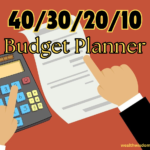Embarking on a journey toward financial wellness can feel overwhelming, especially when you’re just starting out. But the good news is, you don’t need to have everything figured out from the get-go. The most important step is to start where you are, with what you have, and build from there.
In this guide, we’ll explore why personal finance is crucial and how you can begin to take control of your financial future. Whether you’re dealing with debt, trying to save, or simply wanting to understand where your money goes each month, this guide will help you take those first steps toward financial wellness.
Table of Contents
1. Understanding Personal Finance
What is Personal Finance?
Personal finance refers to the management of your money, including how you earn, save, invest, and spend it. It’s about making informed decisions that will help you achieve your financial goals, whether that’s paying off debt, saving for a home, or planning for retirement.
Why It Matters
Good personal finance habits are essential because they empower you to:
- Achieve Financial Independence: Manage your money effectively so you’re not reliant on others or living paycheck to paycheck.
- Prepare for Emergencies: Build a safety net to cover unexpected expenses without stress.
- Plan for the Future: Set and work toward financial goals that will provide security and peace of mind.
2. Start Where You Are: Taking Stock of Your Finances
Before you can make any meaningful changes, you need to understand your current financial situation. This involves:
Creating a Financial Snapshot
- Income: How much money do you bring in each month from your job, side hustles, or other sources?
- Expenses: Track all your expenses, both fixed (like rent or mortgage payments) and variable (like groceries or entertainment).
- Debt: List all outstanding debts, including credit cards, student loans, and any other obligations.
- Savings: How much do you have saved, if anything, in your emergency fund, retirement accounts, or other savings?
Assessing Your Financial Health
Once you have a clear picture, assess where you stand. Are you spending more than you earn? Are you saving anything each month? Understanding your starting point is key to making progress.
3. Budgeting: Your Roadmap to Financial Success
A budget is a tool that helps you control your spending, save more, and avoid debt. It’s your financial roadmap.
Setting Up a Simple Budget
- Track Your Income: List all sources of income.
- List Your Expenses: Include both fixed and variable costs.
- Allocate Funds: Assign your income to cover all expenses, savings, and debt payments.
- Review and Adjust: Regularly review your budget to ensure it reflects your current financial situation and goals.
The 50/30/20 Rule
A popular budgeting method divides your income into three categories:
- 50% for Needs: Essential expenses like housing, utilities, and groceries.
- 30% for Wants: Discretionary spending on things like dining out or hobbies.
- 20% for Savings and Debt Repayment: Building an emergency fund, saving for retirement, and paying off debt.
4. Tackling Debt: One Step at a Time
Debt can be a major obstacle to financial wellness, but it’s not insurmountable. Here’s how you can start to manage and pay down your debt:
Create a Debt Repayment Plan
- List All Debts: Include balances, interest rates, and minimum payments.
- Prioritize Your Debts: Focus on paying off high-interest debt first (the avalanche method) or small balances first (the snowball method) to build momentum.
- Consider Debt Consolidation: If you have multiple debts, consolidating them into a single loan with a lower interest rate might make repayment more manageable.
Stay Committed
Repaying debt takes time and discipline, but each payment brings you closer to financial freedom. Stay motivated by celebrating small victories along the way.
5. Saving for the Future: It’s Never Too Early to Start
Saving money is essential for building wealth and ensuring a secure financial future. Here’s how to start:
Building an Emergency Fund
- Set a Goal: Aim to save at least 3-6 months’ worth of living expenses.
- Start Small: If that feels daunting, start with a smaller goal, like $500 or $1,000, and build from there.
- Automate Your Savings: Set up automatic transfers to your savings account to make saving easier.
Saving for Retirement
- Understand Your Options: Research different retirement accounts, such as a 401(k) or IRA.
- Start Now: The earlier you start saving for retirement, the more time your money has to grow.
- Take Advantage of Employer Matches: If your employer offers a 401(k) match, contribute enough to get the full match—it’s free money!
6. Investing: Growing Your Wealth Over Time
Investing is a way to grow your money over time, but it can seem intimidating if you’re new to it.
Getting Started with Investing
- Learn the Basics: Understand key concepts like stocks, bonds, and mutual funds.
- Start Small: You don’t need a lot of money to start investing. Consider low-cost index funds or ETFs.
- Diversify Your Portfolio: Spread your investments across different asset classes to reduce risk.
Long-Term Focus
Investing is a long-term strategy. The market will have ups and downs, but staying invested over time typically yields positive returns.
7. The Power of Continuous Learning
Personal finance is a journey, not a destination. Commit to continuously improving your financial knowledge by:
- Reading Books and Articles: Seek out reputable sources of financial advice.
- Listening to Podcasts: There are many excellent personal finance podcasts that offer tips and insights.
- Taking Online Courses: Invest in your financial education by taking courses that cover budgeting, investing, and more.
8. Start Today: Your Future Self Will Thank You
The best time to start managing your finances was yesterday; the second-best time is today. It’s okay to start small—every step you take toward better financial management will make a difference.
Final Thoughts
Your journey toward financial wellness doesn’t have to be perfect or fast. What matters most is that you start. By understanding where you are, creating a plan, and committing to learning as you go, you’ll be well on your way to achieving your financial goals.
One post from getrichslowly is definitely worth reading before you start your financial journey. Since this post insipred me to start my journey, it should help you too.

Did you miss this Case Study ! – Quality of life vs. higher pay : A Bengaluru Couple’s decision to move to Luxembourg










